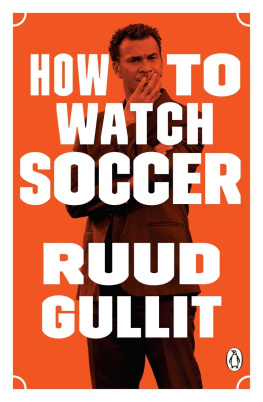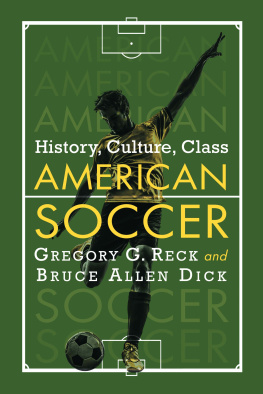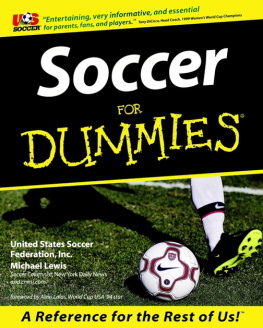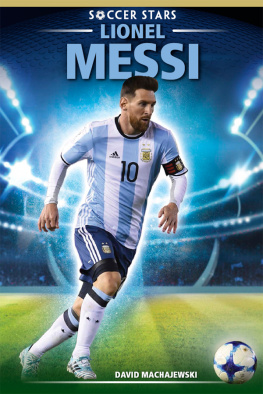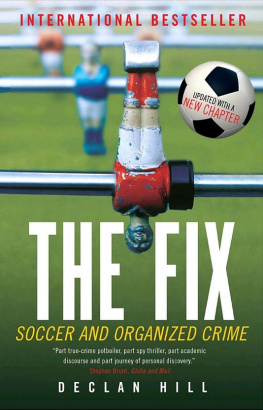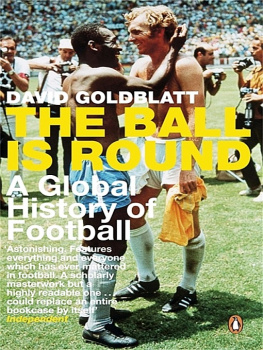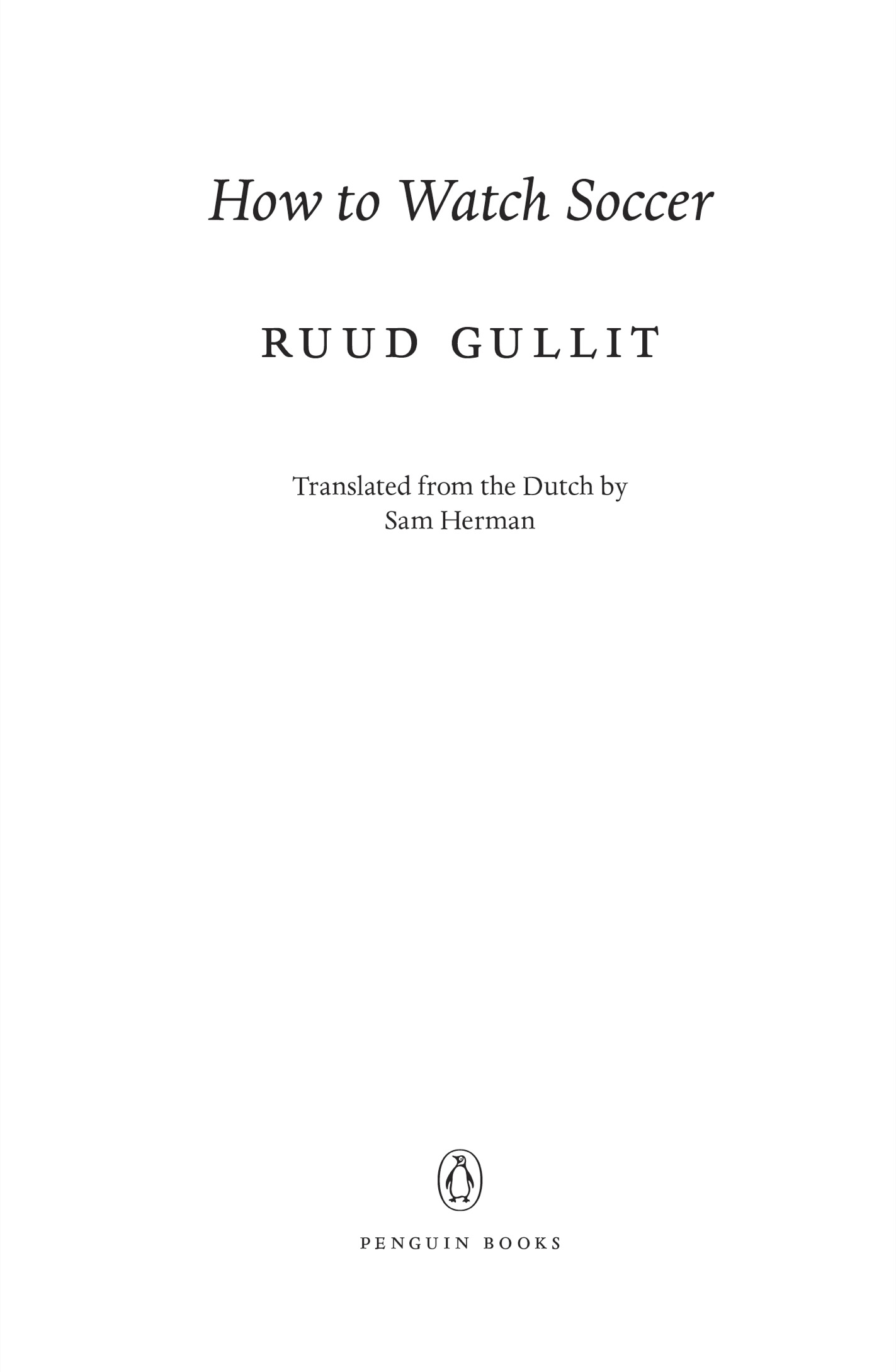Ruud Gullit was born in Amsterdam in 1962. He was the captain of the Netherlands team that won the 1988 European Football Championship and played in the 1990 World Cup. He was named European Footballer of the Year in 1987 and World Soccer Player of the Year in 1987 and 1989. After he retired from the field, he managed the LA Galaxy and several other teams around the world. He currently works as a broadcaster regularly covering soccer matches on television in the United States, the United Kingdom, Germany, France, the Netherlands, and across the Middle East.
Penguin supports copyright. Copyright fuels creativity, encourages diverse voices, promotes free speech, and creates a vibrant culture. Thank you for buying an authorized edition of this book and for complying with copyright laws by not reproducing, scanning, or distributing any part of it in any form without permission. You are supporting writers and allowing Penguin to continue to publish books for every reader.
Foreword
All soccer players have their own style. That goes for soccer analysts too. Some analysts are provocative, some analysts are loud, and some analysts try to stay friends with everyone. When covering soccer, broadcasters like to present a mix of all these styles of commentary to give viewers a complete picture.
When I appear as an analyst, I watch the game as a manager rather than as a player. By contrast, many fans tend to watch as spectators. Its natural, but its the difference between watching a game and watching the ball.
The first thing I look at is how the manager has lined up each team. That tells you immediately what his intentions are and how he plans to hurt the other side. Then as the match starts you watch whether each team manages to execute its game plan, and how the other side has anticipated this plan. From the pattern of play you can see which team is dominating and is able to take an advantage on the basis of its formation and tactics. Now youre already a few minutes into the game and youve hardly even looked at the ball.
As the game continues, I watch for details and look for reasons why things go wrong. Everyone can see the mistake; the point is, why did it happen? Where and why do teams slip up? Often the fault is not with the person who made the error, such as the last defender or the goalkeeper; it starts way before. Not everyone watching the screen can see that. And thats where the analyst comes in: to show things which may not be obvious but that have a crucial impact on the course of the game. I also try to explain how a mistake should have been avoided. I do this without looking for scapegoats. Im critical, I base my comments on what I see, and stay respectful. Theres no need to score points in the media with your remarks.
My approach to soccer is positive. After all, I owe soccer a lot. The sport has given me everything. Ive no desire to air dirty laundry in public; I try to analyze as objectively as possible. I must admit that its hard to talk about some former teammates such as Frank Rijkaard, Carlo Ancelotti and Marco van Basten objectively. Im always positive about these guysI give them the benefit of the doubt, maybe even support them.
I prefer technical, well-planned, attacking soccer, yet the objective must always be to win. Its great to see teams throwing everything into the attack. But it doesnt always pay off, so last season it was not the favorites, FC Barcelona and Borussia Dortmund, who won the Champions League and Europa League. Both teams lacked the shrewdness of the bread-and-butter player whose overriding objective is to win. Even if that means going against the grain and taking on a different identity should the situation demand it.
I enjoy watching Barcelona, but at the same time I hate it when other sides lie down and submit to the supremacy of Messi & Co. You have to do everything thats necessary to win, within the rules, even against Bara.
Thats why I loved watching Atltico Madrid in the quarterfinals of the 2015/16 Champions League. What possible reason could Atltico have had to play Barcelonas game and offer themselves up to the slaughter? Because thats what neutral spectators wanted? If theres no way to win by playing soccer, other weapons besides sheer talent have to make up the difference: such as tactics, and mental and physical strength. Its all about winning.
Diego Simeones team adapted on various levels to make sure it got through to the semifinals of the Champions League; eventually Atltico managed to outmaneuver the supposedly indestructible Barcelona with tough, macho soccer.
At the same time I also enjoyed watching Manchester City in those quarterfinals. Unlike Atltico, Manuel Pellegrinis side didnt look to defend, but went on the attack to eliminate Laurent Blancs stronger Paris Saint-Germain.
Circumstances forced Jrgen Klopps Liverpool to choose another approach to beat a superior Borussia Dortmund side in the Europa League quarterfinals. Twice Liverpool found themselves lagging behind by an almost hopeless margin (20 and 31) at Anfield only to pull out all the stops in an all-or-nothing offensive. Under constant attack by a Liverpool team fired by boundless energy and a never-say-die mind-set, the Germans found themselves 43 down deep into injury time.
Without denying Liverpools obvious achievement, it was no less Borussia Dortmunds fault for allowing the English side to wreak unbridled havoc. By failing to finish them off by scoring more goals or by slowing down the pace to frustrate the other side, they allowed themselves to be drawn into an open game and simply forgot to close it down. There were no minor infringements by the German side: no time-wasting or silly tricks at the corner flag, no one rolling about theatrically on the ground. Those kinds of tactics may not be fun to watch, but after all theres a Europa League semifinal at stake, and thats as good an excuse as any. To allow yourself to be drawn into an English game against an English side is asking for trouble, and in this case the result was defeat and elimination.
I find it fascinating to watch teams stretch themselves to their maximum potential. Atltico Madrid are a great example. They may not be the best players individually, but they manage to go deeper than other teams and to play with more discipline than the other side on the day.
When they play a weaker team that then in turn adapt to their game, its Atltico that find it difficult to dominate. It is always easier to respond to the other sides game. In the round of sixteen of the Champions League, Atltico were on the point of collapse. PSV almost had the Madrilenians on the floor, only to be defeated in the penalty shootout. While PSV adapted, Atltico had to take the initiative and thats what the team found problematic.
As an analyst watching Atltico MadridBarcelona, I was looking to see if Bara had a response to Atlticos driven soccer. Clearly not, since they never really got going and never showed the same level of commitment as their opponents. Barcelonas forwards kept dribbling the ball; thats exactly what you shouldnt do in a confined space. The result is that you lose the ball. Instead you should be trying to keep possession as long as possible, with one or two touches, keeping up the pace. Waiting to create a space and to exploit it. Thats how to avoid tackles and fouls. I was disappointed to see a great team like Barcelona with all those world-class stars unable to use common sense as the game developed. Plan A had been perfected, but it wasnt working, and there was no plan B. Well, in fact sending their tall center back Gerard Piqu to use his height up front turned out to be plan B. It was a desperate measure that they obviously hadnt practiced, since Piqus teammates barely fed him any long, high balls from the touchline or the back. For me, this exposed Barcelonas true weakness.

